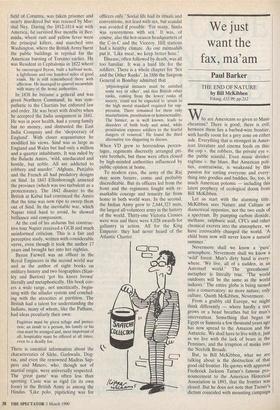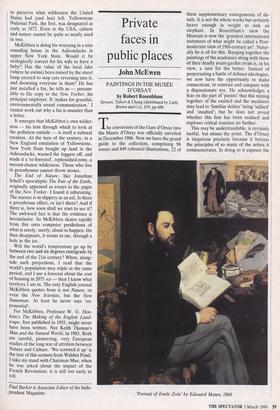We just want the fax, ma'am
Paul Barker
THE END OF NATURE by Bill McKibben Viking, £12.99, pp.212 Why are Americans so given to Mani- cheanism? There is good; there is evil; between them lies a barbed-wire frontier, with hardly room for a grey zone on either side. Everything that is strongest in Amer- ican literature and cinema feeds on this: the cop v. the robbers, the private eye V. the public scandal. Even music divides: ragtime v. the blues. But American poli- tics, contrariwise, is weakened by this passion for sorting everyone and every- thing into goodies and baddies. So, too, is much American polemic — including this latest prophecy of ecological doom from Bill McKibben.
Let us start with the alarming title. McKibben sees Nature and Culture as diametrical opposites, not the two ends of a spectrum. By pumping carbon dioxide, methane, sulphuric acid, CFCs and other chemical excreta into the atmosphere, we have irrevocably changed the world. 'A child born now will never know a natural summer.'
Nevermore shall we know a 'pure' atmosphere. Nevermore shall we know a 'wild' forest. Man's dirty hand is every- where. 'We live, all of a sudden, in an Astroturf world.' The 'greenhouse' metaphor is literally true. 'The world outdoors will be the same as the world indoors.' The entire globe is being turned into a conservatory: no more nature; only culture. Quoth McKibben, Nevermore.
From a grubby old Europe, we might think differently — where hardly a tree grows or a beast breathes but for man's intervention. Something that began in Egypt or Sumeria a few thousand years ago has now spread to the Amazon and the Antarctic. We shall have to live with it, just as we live with the lack of bears in the Pennines, and the irruption of minks into the Norfolk Broads.
But, to Bill McKibben, what we are talking about is the destruction of that good old frontier. He quotes with approval Frederick Jackson Turner's famous pro- nouncement to the American Historical Association in 1893, that the frontier was closed. But he does not note that Turner's dictum coincided with mounting campaign to preserve what wilderness the United States had (and has) left. Yellowstone National Park, the first, was designated as early as 1872. Even in the USA, culture and nature cannot be quite so neatly axed in two.
McKibben is doing his worrying in a nice sounding house in the Adirondacks in upper New York State. Would it be ecologically correct for his wife to have a baby? Has the value of the local lake (where he swims) been ruined by the street lamp erected to stop cars reversing into it, and drowning everyone in them? He has just installed a fax, he tells us — presum- ably to file copy to the New Yorker, his principal employer. It 'makes for graceful, environmentally sound communication.' I cannot work out why a fax is sounder than a letter.
It emerges that McKibben's own wilder- ness — his lens through which to look at the pollution outside — is itself a cultural creation. At the turn of the century, in a New England emulation of Yellowstone, New York State bought up land in the Adirondacks, warned the loggers off, and made it a 're-forested', replenished zone, a second-chance wilderness. Those who live in greenhouses cannot throw stones.
The End of Nature, like Jonathan Schell's apocalyptic The Fate of the Earth, originally appeared as essays in the pages of the New Yorker. I found it infuriating. The science is as slippery as an eel. Is there a greenhouse effect, or isn't there? And if there is, how soon shall we start to see it? The awkward fact is that the evidence is inconclusive. So McKibben skates rapidly from this onto computer predictions of what is surely, surely, about to happen. He then disappears, it seems to me, through a hole in the ice.
Will the world's temperature go up by between two and six degrees centigrade by the end of the 21st century? When, along- side such projections, I read that the world's population may triple in the same period, and I see a forecast about the cost of housing in 2075 AD - then I know what territory I am in. The only English journal McKibben quotes from is not Nature, or even the New Scientist, but the New Statesman. At least he never says 'ex- ponential'.
For McKibben, Professor W. G. Hos- kins's The Making of the English Land- scape, first published in 1955, might never have been written. Nor Keith Thomas's Man and the Natural World, in 1983. Both are careful, pioneering, very European studies of the long war of attrition between Nature and Culture. 'We screwed it up' is the text of this sermon from Walden Pond. I take my stand with Chairman Mao, when he was asked about the impact of the French Revolution: it is still too early to tell.
Paul Barker is Associate Editor of the Inde- pendent Magazine.



























































 Previous page
Previous page